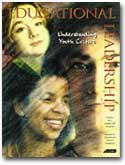Welcome to EL Extra. We have designed questions to help you and your colleagues foster meaningful discussions around the current Educational Leadership
The study guide may be related to a particular article, a group of articles, or a theme that runs through the entire issue. Our questions will not cover all aspects of the issue, but we are hopeful that they will help you generate a conversation around key ideas. Feel free to adapt the questions to be more relevant to your school or school district—and you may even want to think of some of your own. Although you can consider many of the questions on your own, we encourage you to use them in pairs, small groups, or even large study groups.
Connecting with Today’s Youth
- What characterizes your students’ generation?
- Do you believe that students are greatly influenced by technology, consumerism, or isolation? Or, despite new fads and changing values, do students resemble previous generations—even your own?
- What systems are in place in your school or district for adults to make connections with students—to get to know them personally, for example, and to learn about their interests, hobbies, home lives, or concerns?
- What avenues exist for teachers, counselors, or other school staff to follow when they believe that a student might be in trouble?
Plagiarism and Technology
In “Cut and Paste 101: Plagiarism and the Net” (pp. 38–42), Lisa Renard identifies a new phenomenon: Internet cheating.
Is plagiarism in the form of “point-and-click” cheating a problem in your school or classroom? How have you dealt with such occurrences in the past?
Renard offers some practical advice not only to detect Internet cheating, but also to avoid the potential for cheating: Make assignments interesting, embrace the writing process, and teach source documentation. What other suggestions do you have for teachers and schools to emphasize the importance of academic integrity?
Special Topic: Bilingual Education
Compare Rosalie Pedalino Porter’s “The Benefits of English Immersion” (pp. 52–56) with Maria S. Quezada, Terrence G. Wiley, and J. David Ramirez’s “The Shortcomings of the Reform Agenda for English-Language Learners” (pp. 57–61). What are the main points of each article? Which article comes closer to your own ideas about bilingual education?





